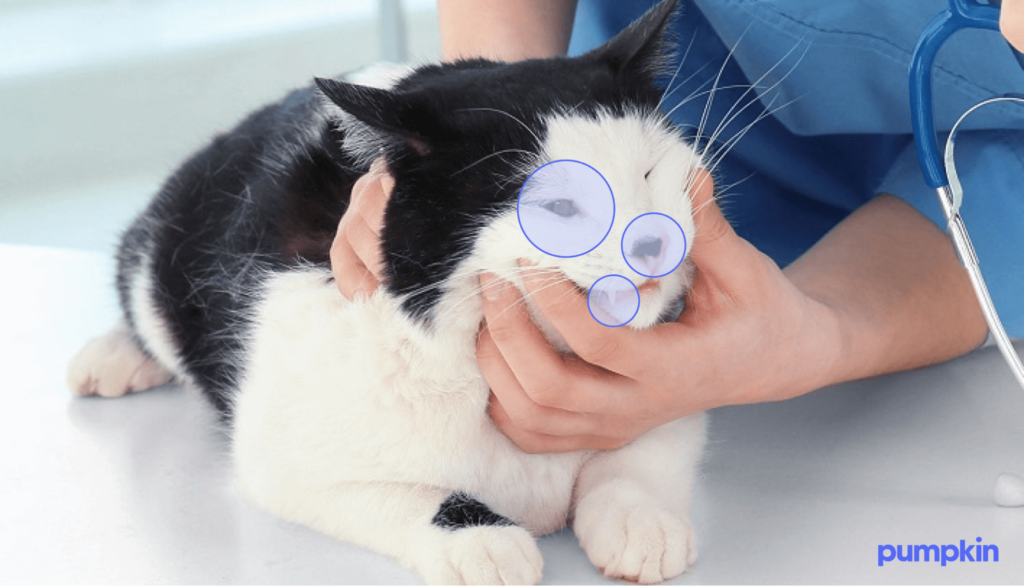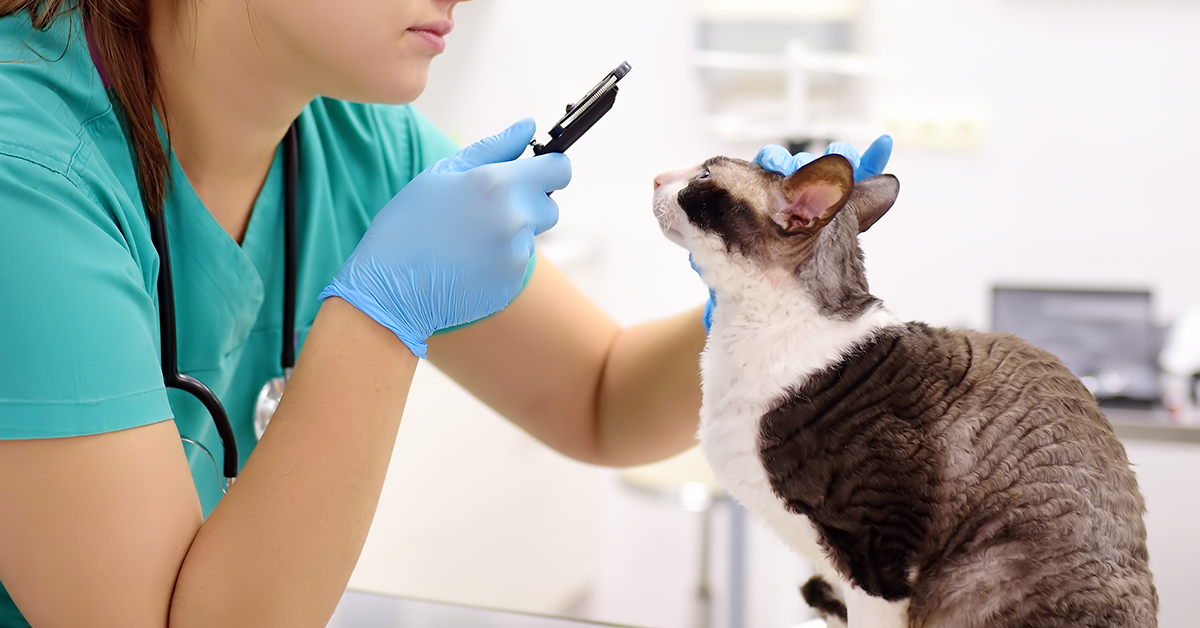Key Points
- Cat herpes is a highly contagious upper respiratory disease that is spread through saliva and ocular and nasal secretions.
- Some of the most common clinical signs of feline herpes include red or swollen eyes, sneezing, and lethargy.
- While there is no cure for feline herpes, the symptoms can be treated relatively easily, giving your cat a happy and full life.
If you think your sneezing and sniffling cat may have feline herpes, or if they’ve recently been diagnosed with this disease, don’t worry — there’s plenty you can do to help them feel better. And while few words inspire as much dread as the word “herpes,” it’s a very manageable illness.
We know it can be scary to see your precious furball with swollen eyes, a runny nose, or constant sneezing. However, this common infection affects over half of all cats, and it can be treated fairly easily. Unlike the human variety of the herpes virus, this disease is not sexually transmitted in cats.
In this guide to feline herpes, we’ll explain where the virus comes from and how to manage the symptoms. With supportive care and proper treatment, your kitty can return to feeling as playful and happy as ever.
What is the feline herpes virus?
Feline herpes virus is a common disease in cats and a common cause of upper respiratory infections. Known as feline herpes virus-1 (FHV-1), it’s also called feline viral rhinotracheitis (FVR).
It’s widespread among the species: over 50% of cats have FHV, with exposure rates in some cat populations reaching 97%.
Common cat herpes symptoms include:
- Red, swollen eyes (conjunctivitis)
- Ocular discharge
- Sneezing
- Nasal congestion and nasal discharge (can be chronic or recurrent)
- Fever
- Lethargy
- Loss of appetite
- Swollen lymph nodes
- Ulcers or sores in the mouth
- Corneal ulcers due to infection of the cornea
- Keratoconjunctivitis sicca (KCS), also known as “dry eye,” which can occur if the virus infects the tear glands
How does cat herpes spread?
Feline herpes virus is spread between cats through contact with secretions from the nose, mouth, or eyes (i.e., saliva, nasal discharge, or eye secretions). Because cats are social groomers, this contagious infection can quickly spread among cats.
The good news? The feline herpes virus does not spread from cats to humans, so you don’t need to treat your cat like a biohazard.
Infection occurs when a cat comes into direct contact with an infected cat or a contaminated object such as blankets or food bowls. Mother cats can also spread the disease to their kittens.
When unexpected illnesses or accidents happen, being prepared with a pet insurance plan can make sure your cat gets the best care possible. Learn more about how Pumpkin pet insurance plans can help cover eligible vet bills in the future.

How long is a cat infectious after getting feline herpes?
Once a cat is infected, they’ll show symptoms after 2-5 days. During this incubation period, your pet can spread the disease to other cats. The active infection usually lasts 10-20 days, and the cat will remain infectious for up to 3 weeks.
Although some cats who contract herpes will eventually clear the infection, most will continue to carry it as a latent infection for the rest of their lives. Although they may not always be infectious, there’s a risk of recurrent flare-ups in the future, especially during periods of stress.
How long can the virus live in the environment?
The virus lives in a moist environment, so it can survive as long as the object remains moist. In a dry environment, the virus dries up and dies pretty quickly. Factors such as humidity, temperature, and surface type greatly impact how long the virus lives on surfaces.
If you think the virus may be present, you can regularly use disinfectants, such as bleach, to get rid of it quickly.
What triggers cat herpes flare-ups?
Cat herpes is often triggered by factors that weaken the immune system, including stress and illness.
- Stress: Changes in your home, new pets, or anxiety from staying home alone too long all cause stress, which can trigger feline herpes flare-ups.
- Illness: Some health issues reduce the body’s ability to fight the virus, which can lead to more regular flare-ups.
Additionally, sunlight exposure, specifically UV rays, may irritate your feline’s eyes or skin, which can trigger herpes symptoms.
You can try to minimize flare-ups by providing your cat with a stable, low-stress environment and taking them for regular vet checkups to monitor symptoms.
Common treatments for feline herpes
Sadly, there is no cure for the feline herpes virus, but cats with this disease can still lead very happy lives. Treatment is about reducing symptoms and improving your cat’s quality of life.
During a flare-up, your cat may need treatment to soothe their symptoms. As mentioned above, the feline herpes virus can cause corneal ulcers, for instance. Cats that present to the vet with a corneal ulcer are often suspected to have a concurrent herpes infection.
Your vet will look for clinical signs, conduct a full physical examination, do some laboratory testing, and review your cat’s medical history to reach a diagnosis. Testing can include:
- PCR test of material swabbed from your cat’s eyes and throat to detect the virus
- Fluorescein dye to check for corneal ulcers
- Schirmer tear test to check tear production
The treatment for feline herpes virus will depend on the cat’s symptoms.
Eye infections: These symptoms are treated with eye drops that contain antibiotics and/or antiviral medication. It’s important to treat ocular infections to avoid permanent damage to your cat’s eyes. For cats that develop KCS/dry eye due to the herpes virus, lifelong care will be necessary to stimulate tear production.
Skin ulcers: On occasion, FHV-1 may also lead to dermatitis and skin ulcers. In these cases, ointments and other dermatological treatment options can help. Medicated ointments and topical treatments may also be used.
Treatments for kittens: Vets may prescribe antibiotics to prevent secondary bacterial infections. This is mainly for kittens since their immune systems aren’t as strong as those of adult cats.
Cats that are very sick with a herpes flare-up may not want to eat or drink. These cats often benefit from subcutaneous fluid therapy and feeding canned food that has been slightly warmed in the microwave to increase the aroma.
If cats have heavy nasal secretions (aka snot) they can benefit from twice-daily steam sessions — simply turn on your shower and lock your cat in the bathroom for 15 minutes to get some great steam therapy.
Is there a vaccine for cat herpes?
Cat herpes vaccines do exist, but unfortunately, they won’t prevent your furball from contracting the disease.
Instead, they reduce the severity of symptoms and shorten the recovery time. As cats are still vulnerable to being overcome by a high viral load, vets recommend they receive regular booster vaccines.
The most common vaccines are the Feline Rhinotracheitis Virus/Herpes Virus 1 and the Feline Calicivirus vaccine, administered to adult cats every 1-3 years, depending on the vaccine. These core cat vaccines require multiple boosters during the first year for kittens and then once every 1-3 years for adult cats.

Because cat herpes is easily spread, infected cats should be kept away from other cats. If you live in a multi-cat household and one cat develops herpes, the others have likely also been infected.
Watch for symptoms, and as with any serious illness, take your kitty to the vet to get them on the road to recovery as soon as possible.
Bottom line: Cats and herpes
Caring for a sick cat can be tough, but you can give them a happy, healthy, and full life with supportive care and treatment. Herpes is a common infection in cats, and many cat owners go through the same situation, so you aren’t alone.
Your feline friend depends on you for comfort and care, and small steps like regular vet visits, keeping up with vaccinations, and providing your furball with a clean, stress-free, and loving environment can make all the difference.
FAQs
- https://vcahospitals.com/know-your-pet/feline-herpesvirus-infection-or-feline-viral-rhinotracheitis
- https://veterinaryvisioncenter.com/my-cat-has-what-the-facts-about-feline-herpesvirus/
- https://journals.sagepub.com/doi/10.1016/j.jfms.2011.03.010c
- https://www.petmd.com/cat/conditions/mouth/mouth-ulcers-cats
- https://vcahospitals.com/know-your-pet/keratoconjunctivitis-sicca-kcs-or-dry-eye-in-cats
- https://www.pdsa.org.uk/pet-help-and-advice/pet-health-hub/conditions/cat-flu-in-kittens
- https://www.petmd.com/cat/general-health/cat-vaccinations-what-vaccines-do-cats-need



